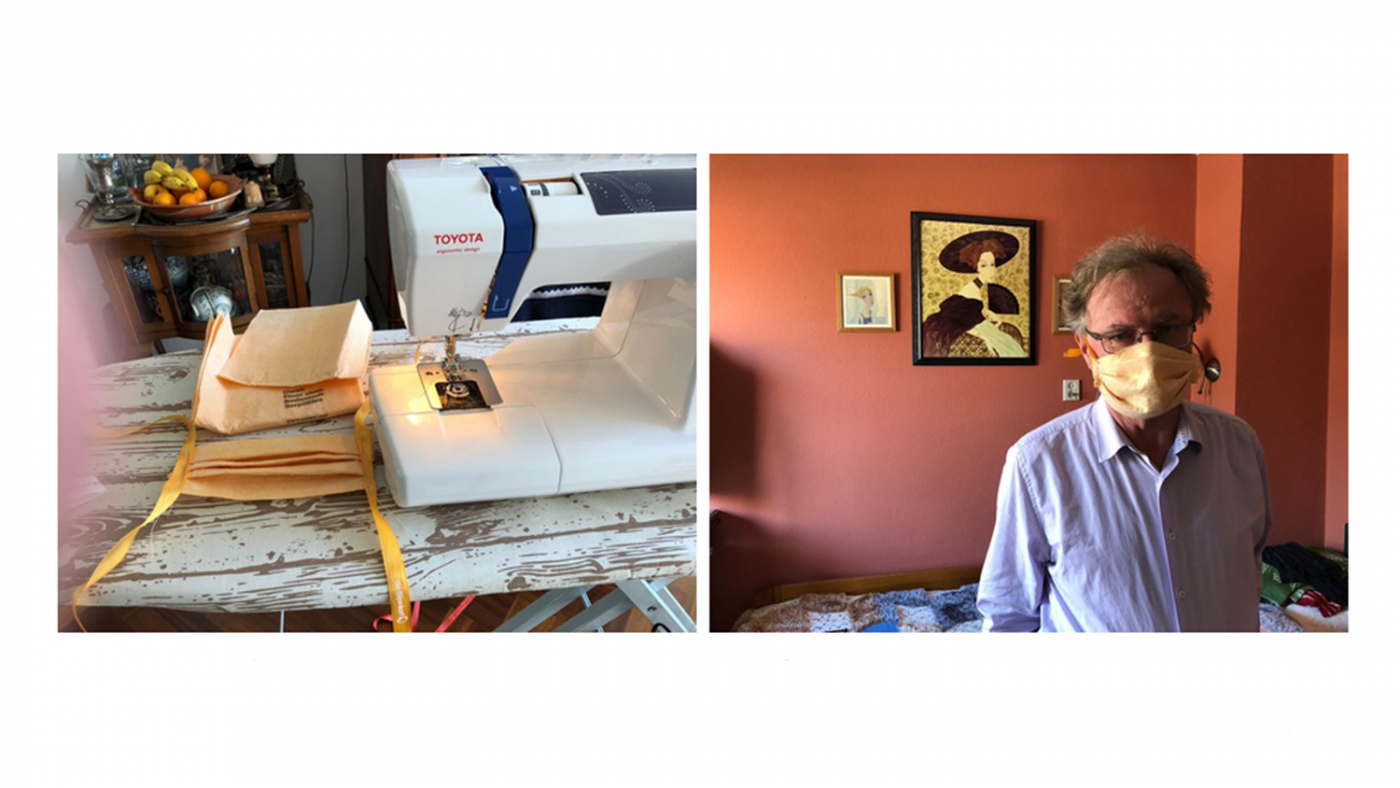Chemist makes his own face masks, and he wants everyone to wear them

Petoukhov has posted an elaborate statement about wearing face masks on his UU profile page. He noticed that almost no one in the Netherlands wears face masks, whereas it’s the norm in many other countries, mainly in Asia. He’s very worried about the fast spread of the virus in the Netherlands.
He compares the situation here with Beijing, basing his statements on data from Johns Hopkins University. In Beijing – half the size of the Netherlands but with 4 million people more than our country – ‘only’ 580 people have been confirmed to have Covid-19, eight people have died, and 418 have recovered. At the time of writing, the Netherlands has 14,697 confirmed cases, 1,339 dead, and 260 recovered. Petoukhov thinks the difference can be partially attributed to wearing face masks or not.
Another one of Petoukhov’s comparisons: “China has 82,361 confirmed cases on a population of 1,428 million, which comes down to 60 officially confirmed cases per one million people. The epidemic has largely come to an end there. The United States currently has 203,608 cases on a population of 327 million, which means over 600 cases per one million people. And that number is rising fast. In the Netherlands, we currently have around 800 confirmed cases per one million residents: more than ten times as much as China. And there’s still the question of just how well we’re testing here.”
Something is better than nothing
In his latest update, he calls for prime minister Rutte to distribute massive amounts of face masks amongst the population. He writes: “How many people have to die before we have sufficient herd immunity? [...] Think about the future of this country!” Petoukhov understands that the availability of professional face masks for health care workers and people with other essential professions has the highest priority, but other people can just as easily make their own face masks, he says. That’s what he did, too. “Of course, a face mask like this doesn’t stop the virus entirely, but something is better than nothing.”
He postulates that wearing a face mask has a number of benefits. For one, it does stop pathogens to a certain degree, he says, and for another, wearing a face masks prevents you from touching your mouth or your nose. Wearing a face mask in public also scares people off: they will probably give you a wide berth.
Adverse effects
Elsewhere in the Netherlands, people are also making their own face masks. The sewing pattern from a face mask from Hong Kong, for example, was widely shared online and used by many.
The RIVM adopts a neutral stance about the home-made face masks. On the phone, a spokesperson says: “For the average citizen, wearing a face mask is superfluous if you stick to the current measures. If you keep sufficient distance, you wash your hands often enough, and stay home when you have symptoms, a face mask adds absolutely no value.”
The RIVM also fears that home-made face masks give people an unjustified sense of security. That false security can lead to people wearing face masks to get closer to each other on the street, for instance, which would lead to adverse effects. “Moreover: not all home-made face masks are equal, so we don’t have any insights on that, and we can’t guarantee anyone’s safety.”
The spokesperson continues: “I can understand people thinking ‘something is better than nothing’. We don’t strongly condemn it, because then we might as well start discouraging people to wear certain clothes. Some general practitioners are also advising people to wear their scarves in front of their faces. It’s mainly important that people really follow the current measures, and if you do, there’s no need to wear a face mask. And if you think: I’m going to wear a face mask so I’ll protect other people from my coughs: if you’re coughing, you should definitely stay inside.”
No harm, no foul…?
Some experts do in fact strongly advise against wearing home-made face masks. If you don’t know how to use them safely, and/or the face masks aren’t the right type, they might actually cause more damage than prevent it, they say.
Viruses thrive in moist environments, so when people breathe into a piece of fabric for some time, one that for instance doesn’t have a filter on it, that will just aid the virus. Breathing through those face masks isn’t nice either, and can in fact unnecessarily exhaust you. It makes it harder to breathe, which is something that corona patients are already struggling with. Moreover, many face masks don’t line up with your face correctly, which means they’ll still let pathogens through.
The only thing a face mask actually does help with is making sure you touch your face less often. “But the virus can still enter through your tear ducts,” Bert Niester, head of the section of clinical virology at the University Medical Centre Groningen (UMCG), told newspaper de Volkskrant in February.
Petoukhov mostly hopes that people take their social responsibility and help curb the spread of the virus. “Practice social distancing, and always wear gloves and a face mask when you go outside. And wash your hands after touching any surface.”